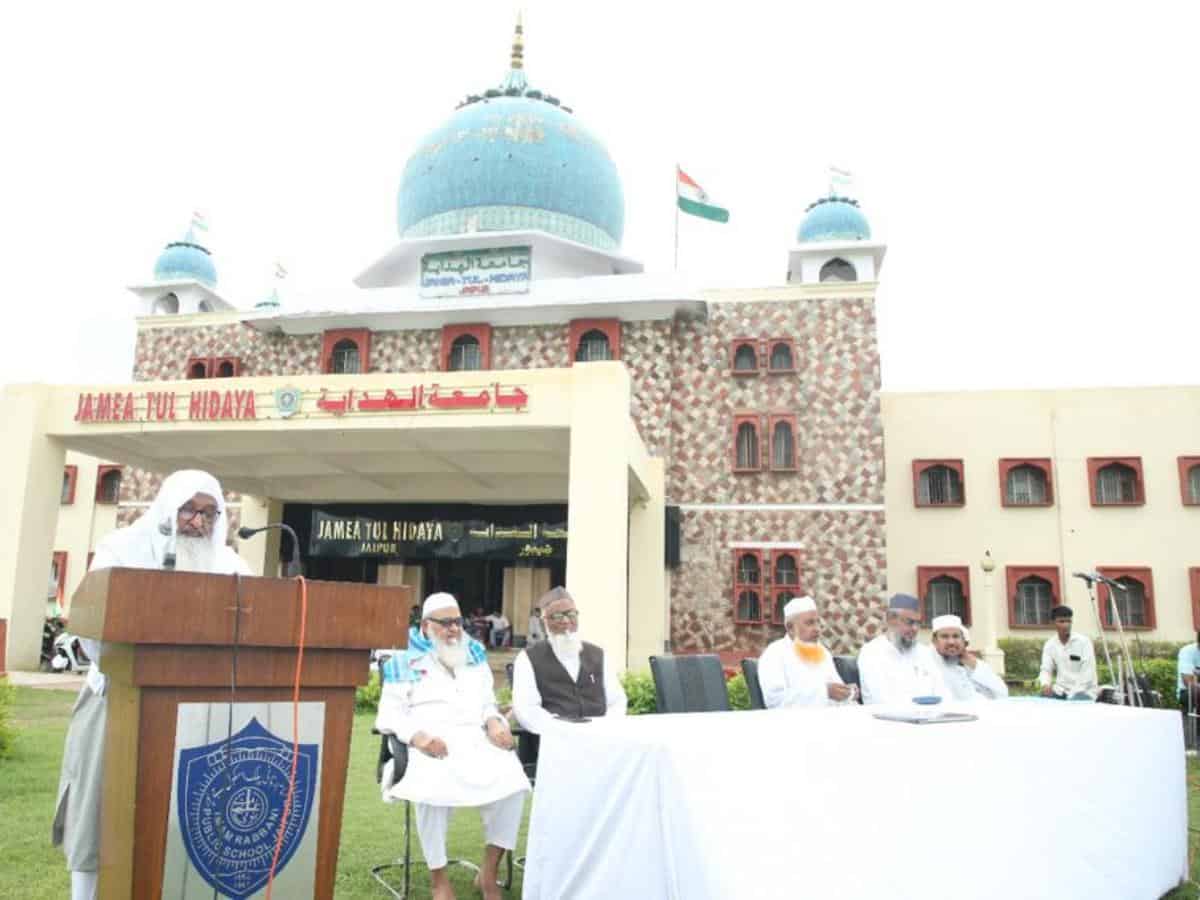
Jaipur: Leading Madrasa of the country namely Jamea Tul Hidaya here in Jaipur celebrated enthusiastically India’s 75th Independence Day on Monday.
The national flag was unfurled at the academic building of the Madrasa institution by Maulana Fazlur Rahim Mujaddadi, Rector of the institution, in the presence of teaching staff, students and invited guests. The whole environment reverberated with the clapping of hands from the audience as the flag fluttered. Simultaneously, National anthem was sung followed by distribution of sweets to mark this historical and memorable occasion.
Maulana Fazlur Rahim Mujaddadi, who is also secretary of All India Muslim Personal Law Board, in his keynote address on the occasion, explained the importance of the Day and the sacrifices of our freedom fighters in this cause in which India attained freedom by overthrowing the British yoke. He said that the 15th of August is the interpretation of our long-standing dreams. This day is the interpreter of our courage, aspirations and vision. If seen in the true sense, this day is a day of self-sacrifice, continuous struggle and action. Actually 15th August is the title of the long history of India’s independence. So, when the Independence Day comes, many feelings and emotions start to take turns in our minds, the caravan of events and incidents from the fog of the past time start appearing before our eyes.

Matter of great regret
Maulana Mujaddadi said that it is a matter of great regret that today in our country there is a tendency to ignore the culture and history of Muslims and their past achievements. The era was the era of a foreign nation which did not do anything for the development and prosperity of the country that India could be proud of. The fact is that the Muslims spent their best abilities and intelligence in the construction and development of the country, enriched it with advanced and polite civilization, gave the motherland a great place and swore to protect its honour and sanctity, and when it was attacked, blood was shed to the last drop.
He said that when a Muslim born in independent India looks back at his past, he becomes proud of it, because he has Hazrat Shah Waliullah, Hazrat Shah Abdul Aziz, Hazrat Syed Ahmad Shaheed, Hazrat Maulana Qasim Nantowi, Hafiz Zaman Shaheed, Hazrat Maulana Rashid Ahmad. Gangohi, Shaikh-ul-Hind Maulana Mahmud Hasan and Shaikh-ul-Islam Maulana Syed Hussain Ahmad Madani have bright faces of Mujahideen, but when he studies today’s Indian literature and history, he does not find any mention of the sacrifices of his predecessors, and if they do, it is in such a way that their true form has been distorted.
Muslims first recognized British as a threat
It was the requirement of love for the dear country that the Muslims were the first to consider the arrival of the Farangis (British) as a threat to the country and they also took the initiative to defend it. Long before the existence of the East India Company, Vasco de Gama had reached India and had gradually established their settlements along with pirates on the coastal areas. Then Hazrat Mujaddadi al-Fisani was the first to realize these dangers and lit the torch of Hurriyat movement in 1585 to defend the country, he pointed out.
“National unity is the heritage of our past and the trust of the future. Our history is a witness that our joys and sorrows have been shared and no force can divide us on religious, linguistic or ethnic grounds, because our cultural tradition has been one, our fairs, festivals, rituals and customs and above all our outlook on life has been common. The basis of our Indian nationality is this commonality, and this sense of Indianness is our identity and recognition in the world. Our identity or our national identity is the pledge of this national unity, our languages, our dialects, our worship, clothes, food and drink, so that many aspects of life may be different from each other, but this is not a conflict, but our cultural diversity”, he explained.
Pandit Nehru quoted
In the words of Pandit Jawaharlal Nehru, first Prime Minister of India, he quoted: “India was always united in spite of geographical, religious and cultural differences among the people. India has Unity in Diversity, that is not something imposed from outside, but it is deeper and within its fold”.
The true image of national unity is unity in this abundance, the beacon of Indian civilization amidst the ruins of the great civilizations of the world has been spreading the rays of love, peace and harmony, social justice and human dignity in the world for thousands of years. Yes, this is a lamp of love which is the duty of all of us Indians to keep lit. He said: “I am sure that hundreds more lamps will be lit by this lamp. If the events of the past had darkened the roads, this darkness will now be replaced by the light of the future, and the caravan of our country will be seen moving with full enthusiasm on the highway of progress”, he concluded.
In the end prayers were made for the stability, prosperity, integrity and safety of our beloved Nation. Maulana Mohammad Abrar Khan Nadvi compeered the function with aplomb.

